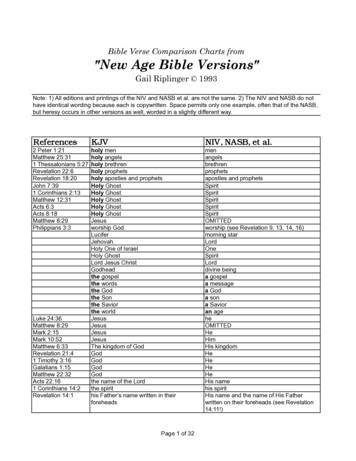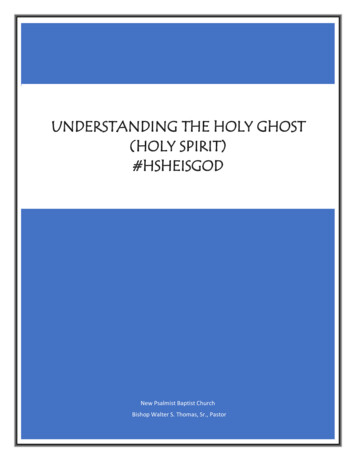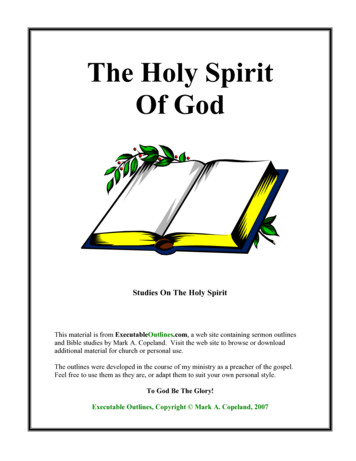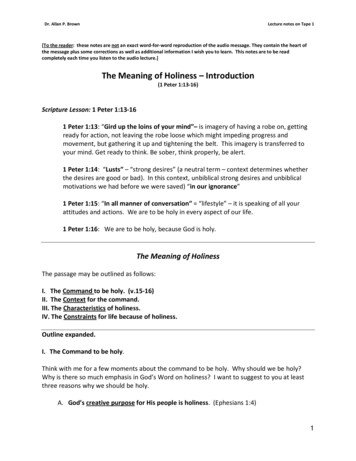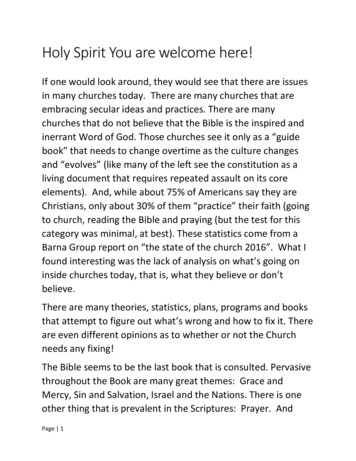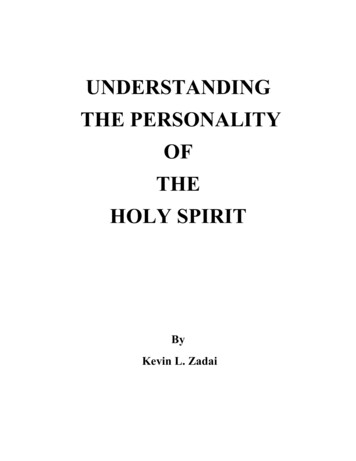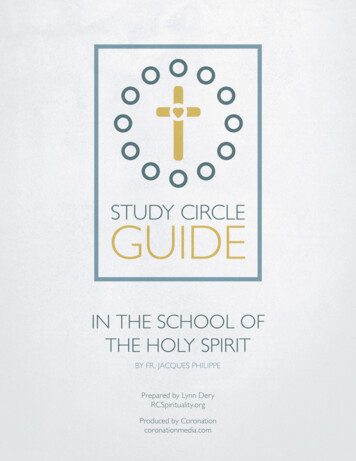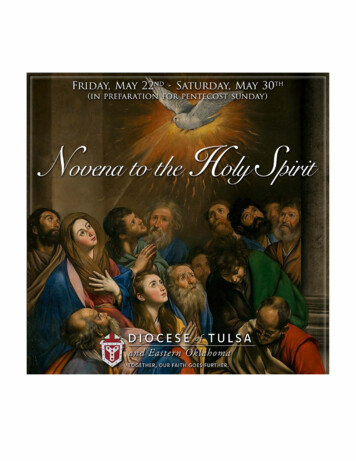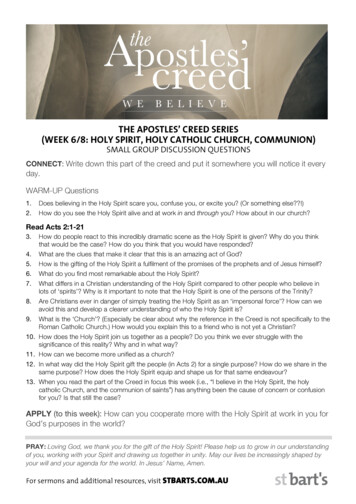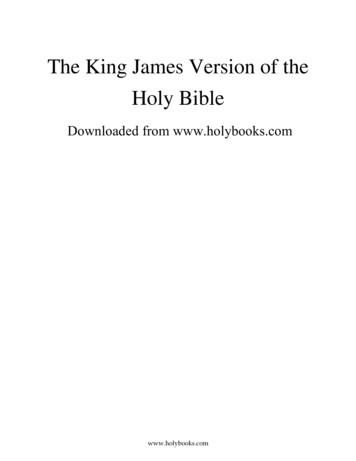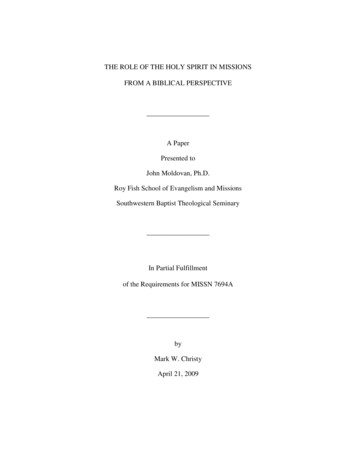
Transcription
THE ROLE OF THE HOLY SPIRIT IN MISSIONSFROM A BIBLICAL PERSPECTIVEA PaperPresented toJohn Moldovan, Ph.D.Roy Fish School of Evangelism and MissionsSouthwestern Baptist Theological SeminaryIn Partial Fulfillmentof the Requirements for MISSN 7694AbyMark W. ChristyApril 21, 2009
TABLE OF CONTENTSPageHistorical Overview.2The Role of the Holy Spirit in Missions before Pentecost .6The Holy Spirit in the Old Testament .6The Ministry of the Holy Spirit in the Life of Christ .9The Role of the Holy Spirit in Missions after Pentecost .12The Role of the Holy Spirit in Conversion .12The Role of the Holy Spirit in Sanctification.17The Role of the Holy Spirit in Teaching .18The Holy Spirit and the Christian Communicator .20Missiological Implications and Applications .31Implications for Church Growth .31Implications for Spirit-Baptism .33Implications for Church Structure .42Implications for the Holy Spirit's Work in Other Religions .42Conclusion .46SELECTED BIBLIOGRAPHY .50Primary Works.50Secondary Works.51Commentaries .51Books .53ii
Articles .57Dissertations and Projects .58Published Papers .59iii
THE ROLE OF THE HOLY SPIRIT IN MISSIONSFROM A BIBLICAL PERSPECTIVEDeveloping a biblical understanding of the Holy Spirit‟s role in missions, asthis paper will show, is absolutely essential going into the 21st century.1 Christians mustdevelop, through careful exegesis of the Scriptures, a strong appreciation of the HolySpirit‟s role in missions. This appreciation begins with the acceptance of the Scriptures asthe authoritative revelation of the Holy Spirit‟s role in missions.To help Christians develop their understanding, this study will assess the roleof the Holy Spirit before Pentecost, as expressed in the Old Testament and the life andministry of Jesus Christ, the role of the Holy Spirit in missions after Pentecost, andanalyze and evaluate the major missiological implications and applications. Due to thecontroversy over the meaning of mission and missions, the definition of these terms, forthe purposes of this discussion, will now be established. Mission, as George W. Peterssays, is “the total biblical assignment of the [C]hurch of Jesus Christ.”2 Missions, as apart of mission, is the preparation and sending forth of God‟s people to engage nonbelievers in particular through their witness (verbal and non-verbal) and proclamation ofthe Gospel. For the purposes of this study, this definition of missions applies to allbelievers after the Pentecost.1In this paper, the Holy Spirit is referred to by various names including the Holy Spirit, Spirit,and God‟s Spirit.2George W. Peters, A Biblical Theology of Missions (Chicago: Moody, 1972), 11.1
2To help the reader understand the role of the Holy Spirit in missions from abiblical perspective, this paper will begin by surveying a historical understanding of theHoly Spirit as it relates to missions. Then, some highlights on the Holy Spirit‟s role inmissions in the Old Testament will be conveyed before discussing His mission.3 Next,this paper will offer research on the Holy Spirit‟s responsibility in and through the life ofthe believer in relation to missions. Afterwards, some missiological implications andapplications on topics related to this study will be evaluated. Such topics will includechurch growth, Spirit-baptism including tongues and miracles, church structure, and theHoly Spirit in other religions. While these topics will continue to be debated in the 21stcentury, the author of this paper will attempt to offer enough insights to help the readerformulate some conclusions.Historical OverviewThe role of the Holy Spirit in missions has received a lot of scholarly attentionin recent decades primarily due to the rise of Pentecostalism.4 Within the Roman CatholicChurch, the function of the Holy Spirit became “institutionalized” and absorbed withinthe ministries of the Church to the point that it lost its place as guide and leader inmissions.5 The institutionalization of the Holy Spirit‟s task by the Roman Catholic3From this point forward, OT will be used to abbreviate Old Testament.4Robert L. Gallagher, “The Forgotten Factor: The Holy Spirit and Mission in ProtestantMissiological Writings from 1945-1955,” in Footprints of God: A Narrative Theology of Mission, ed.Charles Van Engen, Nancy Thomas, and Robert Gallagher (Monrovia, CA: MARC, 1999), 200. Gallagherdisagrees and laments on the lack of scholarship on the Holy Spirit‟s role in mission even though he offersa fairly extensive bibliography of works related to the topic. It seems that much discussion has occurred onthis topic; however, there seems to be a great need for a comprehensive work to be done that covers allaspects of the topic that have surfaced in the last century. Pneumatology from Third-World theologians andpluralists is certainly bringing a lot of new perspectives that need more attention from scholars.5Roelf S. Kuitse, “Holy Spirit: Source of Messianic Mission,” in The Transfiguration of
3Church may have originated in Augustine of Hippo‟s assertion that the Holy Spirit wasthe soul of the Church.6 While the Roman Catholics have been focused on the Church asthe visible presence of the Holy Spirit, the Reformation, according to Louis Berkhof, ledto an emphasis upon the Holy Spirit‟s work of renewal within the believer.7The reformer‟s teaching on the Holy Spirit‟s role in the life of believers mayhave given new inspiration to those who were dissatisfied with the institutionalizedRoman Catholic Church, but it also may have led to limitations being placed on the HolySpirit‟s work beyond the individual.8 Whereas the Roman Catholics of Luther‟s day mayhave allowed the Holy Spirit to be absorbed into the Church, some reformers may haveallowed the Holy Spirit to be absorbed into the life of the believer by focusing on theinner spiritual life of believer and the Holy Spirit‟s activity through the Word.9 TheMission: Biblical, Theological, & Historical Foundations, ed. Wilbert R. Shenk, Institute of MissionaryStudies 12 (Scottdale, PA: Herald, 1993), 106.6Saint Augustine, On the Day of Pentecost, trans. Edmund Hill, in vol. 7 of The Works of SaintAugustine: A Translation for the 21st Century: Sermons on Liturgical Seasons: Part III ― Sermons, ed.John E. Rotelle (New Rochelle, NY: New City, 1993), 276.7Louis Berkhof, Systematic Theology, 4th rev. ed. (Grand Rapids: Eerdmans, 1977), 553.Berkhof writes about the Roman Catholic Church, “All emphasis falls, not on the invisible Church as thecommunio fidelium, but on the visible Church as the mater fidelium.”8James Leo Garrett, Jr., Systematic Theology: Biblical, Historical, and Evangelical, 2nd ed.(North Richland Hills, TX: BIBAL, 2001), 2:209. Garrett adds, “[T]he structures of congregational polity . . can make the Spirit captive . . . to the whims of the majority.” This captivity seems eerily similar to theRoman Catholic‟s institutionalization of the Holy Spirit.9David J. Bosch, Transforming Mission: Paradigm Shifts in Theology of Mission, AmericanSociety of Missiology Series 16 (Maryknoll, NY: Orbis, 1995), 115; Craig L. Nessan, “Allergic to theSpirit No More: Rethinking Pneumatology,” Currents in Theology and Mission 21 (1994): 185. Boschobserves that the reformers emphasized the Holy Spirit‟s role of illumination of the human mind throughthe Word of God. This emphasis along with the reformer‟s emphasis on justification by faith isfundamental to mission praxis. But if one only describes God‟s Spirit objectively in the Word and in thebeliever, an underdeveloped pneumatological theology results. According to Nessan, Luther limited hisdiscussion on the role of the Holy Spirit to “prevent unChristian and anti-Christian sentiments from beingheralded as new inspiration.” Luther‟s concern seems similar to that of modern-day dispensational andreformed theologians concerning Pentecostal pneumatology.
4resurgence of personal piety ignited by the reformers certainly caused a long overduespiritual renewal to occur throughout the West so one may understand why local missionstook precedence over global missions for two centuries.10 One might also understand whyCalvin focused on inner spiritual renewal and the deep association of the Holy Spirit andthe Word of God.11The modern debate over the role of the Holy Spirit in missions was ignited bythe Pentecostals whose emotional excesses (in the eyes of some evangelicals), along withtheir teaching of baptisms in God‟s Spirit, miracles, and tongues as a proof of salvation,caused upheavals in mainline denominations and controversy for evangelicals ingeneral.12 Mainline denominations, including the Roman Catholics, Lutherans,10J. Hebert Kane, A Concise History of the Christian World Mission: A Panaramic View ofMissions from Pentecost to the Present, rev. ed. (Grand Rapids: Baker, 1982), 77; Yong Jo Song, “TheHoly Spirit and Mission: Toward a Biblical Understanding to the Holy Spirit on Relation to the Mission ofthe Church with Special Reference to Contemporary Religious Movement in Korea” (D. Miss. diss., FullerTheological Seminary, 1981), 20; J. Wayte Fulton, Jr., “The Theology of Regeneration,” in One Race, OneGospel, One Task: World Congress on Evangelism, vol. 2 (Minneapolis: World Wide, 1967), 158;Theodore J. Stanley, “Regeneration and the Believer,” in One Race, One Gospel, One Task: WorldCongress on Evangelism, vol. 2 (Minneapolis: World Wide, 1967), 164-65. Kane connects the modernmissionary movement which began with William Carey to Pietistic movement which began in Germanywith Philip Spener in the seventeenth century. Even though the modern missionary movement did not beginuntil 1792, the Danish-Halle Mission and the Moravians were active in the eighteenth century. Song alsoagrees that the Church did not start focusing on the role of God‟s Spirit in mission until the eighteenthcentury because the reformers were preoccupied with the Holy Spirit‟s role in revelation and regeneration.Fulton discusses the Reformer‟s view that regeneration and conversion were “more or less synonymous.”Stanley expands the meaning of regeneration to include all the Holy Spirit‟s work in the believer. For thepurposes of this paper, regeneration and sanctification refer to all of the Holy Spirit‟s work in the believerfrom the point of salvation, and conversion refers to the point of salvation.11John Calvin, Institutes of the Christian Religion, 6th American ed., vol. 1, trans. John Allen(Philadelphia: The Westminster Press, 1935), 79. Calvin writes, “[T]he testimony of the Spirit is superior toall reason. For, as God alone is a sufficient witness of [H]imself in [H]is own word, so also the word willnever gain credit in the hearts of men, till it be confirmed by the internal testimony of the Spirit.”12JangWoo Lee, “Power Evangelism in the Third Wave Movement and Its Implications forContemporary Church Growth” (Ph.D. diss: Southwestern Baptist Theological Seminary, 2000), 40-42.Lee notes that the Holiness Movement (1967) which occurred even before the Pentecostal movement(1906) had focused on Spirit-baptism in connection with complete sanctification and even healing amongsome participants.
5Episcopalians, and United Methodists, were influenced by the Charismatics who broughtthe Pentecostal teachings on Spirit-baptisms and miracles into their assemblies during the1960‟s.13 The Southern Baptists and the Lutherans in the Missouri Synod, however,resisted charismatic incursions.14 In response, some evangelicals became more open tothe role of spiritual gifts in the Church but stood firmly against the teaching of Spiritbaptism and tongues as a required proof of salvation.15In reaction to the excesses of some Pentecostals, some evangelicals, includingthe Southern Baptists, began placing more emphasis on God and Jesus with the HolySpirit getting very little of their attention.16 Moreover, Alvin Reid suggests that the HolySpirit is neglected among some evangelicals because His intangibility makes Hispersonhood hard to grasp.1713C. Peter Wagner, The Third Wave of the Holy Spirit: Encountering the Power of Signs andWonder Today (Ann Arbor, MI: Vine, 1988), 17; Vinson Synan, The Holiness-Pentecostal Tradition:Charismatic Movements in the Twentieth Century (Grand Rapids: Eerdmans, 1997), 233.14Randall Herbert Balmer and Lauren F. Winner, Protestantism in America (New York:Columbia University Press, 2002), 78-79.15Wagner, The Third Wave of the Holy Spirit, 18; Gary B. McGee, “Pentecostal andCharismatic Missions,” in Toward the Twenty-First Century in Christian Mission: Essays in Honor ofGerald H. Anderson, Director, Overseas Ministries Study Center, New Haven, Connecticut, Editor,International Bulletin of Missionary Research, ed. Gerald H. Anderson, James M. Phillips, Robert T. Coote(Grand Rapids: Eerdmans, 1993), 41; John F. MacArthur, Charismatic Chaos: Signs & Wonders, Speakingin Tongues, Health, Wealth, & Prosperity, Charismatic Televangelism Does God Still Speak Today?(Grand Rapids: Zondervan, 1992), 178. Wagner calls these evangelicals “The Third Wave” because theyhave incorporated healing, exorcisms, and other manifestations of the Holy Spirit into their ministry.McGee, however, remains unconvinced that these evangelicals should be separated from the Charismaticsand Pentecostals. MacArthur goes even further by saying the “fundamental orientation” of theseevangelicals “is not biblical,” since these evangelicals, in his view, focus too heavily on the experientialdimensions of the faith.16Alvin Reid, Introduction to Evangelism (Nashville: Broadman & Holman, 1998), 153; JeraldR. White, Jr., The Spirit and Presence of Christ: Pure Water to Refresh Your Soul (Longwood, FL: Xulon,2005), 23.17Reid, Introduction to Evangelism, 154.
6Harold Lindsell notes two major obstacles facing those who seek to reassertthe Holy Spirit‟s role in missions: the human tendency toward self-reliance andecclesiastical bureaucracies which inhibit one from following any guidance of the HolySpirit which breaks policy.18 These two obstacles must be overcome so that missions,empowered by the Holy Spirit, can occur. It is important for all students of missions toappreciate the lessons learned from the past even as they continue to develop andimplement a pneumatological theology of missions in their praxis. To develop thistheology, one must first develop an understanding of the Holy Spirit‟s role in the OT.The Role of the Holy Spirit in Missions before PentecostThe Holy Spirit in the Old TestamentThe Holy Spirit is first mentioned in the Genesis 1:2 where He representsGod‟s presence in the creation work of God.19 In Isaiah 32:14-18, the presence of theHoly Spirit upon humanity is associated with the blessings of God and the manifestationsof justice, righteousness, and peace.20 When the presence of the Holy Spirit is removedfrom people, the blessings from God go with Him (Isa 63:10). Other references in the OT18Harold Lindsell, An Evangelical Theology of Missions (Grand Rapids: Zondervan, 1970),214-15.19All biblical references in the Hebrew language in this paper are from the Biblia HebraicaStuttgartensia. Kenneth A. Matthews, Genesis 1-11:26, The New American Commentary, vol. 1A(Nashville: Broadman & Holman, 1996), 135. Matthews notes x;Wr iin Genesis 1:2 can also mean “wind” if yhilê {a/ is translated as “terrible” or “mighty,” but he prefers to translate x;Wr to mean “Spirit.” He points toPsalm 104:30 as evidence since this verse testifies to the presence of the Holy Spirit in God‟s creativework.20Hans Wildberger, Isaiah 28-39: A Continental Commentary, trans. Thomas H. Trapp(Minneapolis: Fortress, 2002), 260-61. Wildberger argues that the changes wrought by the Holy Spiritoccur first in nature then in people. However, the prophet foretells of jP' v.mi in the wilderness and hq'dc' . in thegarden (Isa 32:16). Both of these characteristics which are unique to God‟s presence only come after “theSpirit is poured upon” God‟s people (Isa 32:15).
7refer to a time when God‟s Spirit will be poured out upon humanity in an even morepowerful way causing hearts to be changed so that people desire to please God (Ezek36:26-27; 39:29; Joel 2:28-29).21 This changing activity of the Holy Spirit within thehuman heart, as Walter C. Kaiser, Jr. argues, will extend to the whole of humanity.22God‟s Spirit is also prophesied to be poured on the Messiah. In Isaiah 11:2-4,one learns that God‟s Spirit “will rest on [H]im” causing the characteristics of God to bepresent with Him to judge righteously and to establish peace (cf. Isa 32:14-20; 42:1).23Jesus Himself refers to Isaiah 61:1 when he declares that God‟s Spirit is upon Him for thepurpose of declaring the Gospel (Luke 4:18). He will “proclaim freedom for the captivesand release from darkness for the prisoners, to proclaim the year of the LORD's favor andthe day of vengeance of our God” (Isa 61:1-2; cf. Luke 4:18-19). Those who receive the21Daniel I. Block, The Book of Ezekiel: Chapters 1-24, The New International Commentary onthe Old Testament (Grand Rapids: Eerdmans, 1997), 353-53; Idem, The Book of Ezekiel: Chapters 25-48,The New International Commentary on the Old Testament (Grand Rapids: Eerdmans, 1998), 356; WaltherZimmerli, Ezekiel 2: A Commentary on the Prophet Ezekiel Chapters 25-48, trans. James D. Martin,Hermenia: A Critical and Historical Commentary of the Bible (Philadelphia: Fortress, 1983), 263. InEzekiel 36:26-36, Block observes that the “the new heart is given . . . to the Israelites, but the Spirit isplaced within . . . them.” Commenting on Ezekiel 11:19, Block notes that the prophet‟s message on theindwelling of the Holy Spirit is associated with Jeremiah‟s message on the change in the human heart andEzekiel‟s message on the change in the human spirit (Jer 32:39; Ezek 36:26). Zimmerli connects thismessage with the prophet‟s emphasis on eternal life being and with the Holy Spirit‟s indwelling presence(Ezek 37:13-14). The indwelling of God‟s Spirit will be discussed later in this paper.22Walter C. Kaiser, Jr., “The Promise of God and the Outpouring of the Holy Spirit: Joel 2:2832 and Acts 2:16-21,” in The Living and Active Word of God: Studies in Honor of Samuel J. Schultz, ed.Morris A. Inch and Ronald F. Youngblood (Winona Lake, IN: Eisenbrauns, 1983), 119. Lancelot CharlesLee Brenton, ed., The Septuagint Version of the Old Testament with an English Translation and withVarious readings and Critical Notes (London: Samuel Baxter and Sons Limited, 1971), 1083. Kaiserobserves the presence of g:ïw before male and female servants in Joel 2:29. It seems that the Septuaginttranslators may have attempted to avoid this conclusion by adding mou as a modifier of dou,louj to indicatethat these servants were servants of God and not simply the servants of the Israelites.23All biblical references in the English language in this paper are from the New InternationalVersion.
8Messiah‟s message will be called oaks of qd C,ê “righteousness” indicating once again that achange will take place in the Messiah‟s followers.The presence of the Holy Spirit in the world empowers humanity according toseveral OT passages. In Psalm 104:30, God‟s Spirit is credited with the creative power oflife (cf. Job 34:14-15). The Holy Spirit not only provides life to humanity, he alsoempowers people to do works of service unto God. Joshua, the Judges, Saul, and Davidare enabled by God‟s Spirit to lead Israel and deliver them from their enemies.24 Theempowering presence of the Holy Spirit is also upon God‟s people in the OT to protectthem and to help them to defeat their enemies. His protective presence is with theIsraelites during the exodus and after the exile (Isa 63:11-12; Hag 2:5). God‟s Spirit isalso with David in the most unusual way. When Saul was trying to kill him, the HolySpirit falls upon Saul and his men causing them to prophecy (1 Sam 19:20-23).25The Holy Spirit‟s power is given to all OT writers and prophets “[f]orprophecy never had its origin in the will of man, but men spoke from God as they werecarried along by the Holy Spirit” (2 Pet 1:21). While God uses humans to transmit Hismessage in Scripture, the message in Scripture is God‟s message and not the writer‟sinterpretation of that message (2 Pet 1:20). According to Philo, “[A] prophet does not24Num 27:18; Deut 34:9; Judg 3:10; 6:34; 11:29; 13:25; 14:6, 19; 15:14; 1 Sam 11:6; 16:13.25C. F. Keil and F. Delitzsch, Biblical Commentary on the Books of Samuel, trans. JamesMartin (Grand Rapids: Eerdmans, 1956), 104; P. Kyle McCarter, Jr., I Samuel: A New Translation withIntroduction, Notes & Commentary, The Anchor Bible, vol. 8 (Garden City, NY: Doubleday, 1980), 184,330. McCarter argues that 1 Samuel 19:18-24 is a later addition to the text because the question in v.24seems at odds with the same question in 10:10-12. In both passages, Saul prophesies, but the impliedanswer, according to McCarter, for the question in the last passage is a negative whereas the other passageseems to anticipate a positive response. Keil and Delitzsch consider the question in both passages to simplybe one of surprise given that Saul‟s prophesying did not continue outside of these two events. McCarteralso wonders how this passage could be authentic since Samuel, according to him, declares that he neversaw Saul alive again (1 Sam 15:35). Samuel, however, only says he would never go to Saul; he does notsay that Saul would not come to him.
9utter anything whatever of his own, but is only an interpreter . . . while the divine [S]pirithas entered in and taken up [His] abode there”26 Jesus Himself assumes divine authorshipof the OT throughout His ministry (Matt 1:22; 4:4-10; 19:5; Mark 7:9-13).Along with the prophets, it seems that the OT laymen could be empowered todo works of service by God‟s Spirit. Filled with God‟s Spirit, Bezalel has the ability toperform various trades needed to construct the tabernacle (Ex 31:3; 35:31). The HolySpirit not only empowers Bezalel to fulfill His commandments related to the constructionof the tabernacles, He also empowers other Israelites through Bezalel by giving him theability to teach others these trades (Ex 35:34). The Holy Spirit‟s empowering activitythroughout the OT era continued in the ministry of Christ.The Ministry of the Holy Spirit in the Life of ChristA careful study of the life of Christ reveals more information on the HolySpirit and sets the stage for His role in missions. Christ‟s mission recorded in the Gospelsserves as the “prototype” for the mission of the Holy Spirit after Pentecost.27 Jesus isconceived by the Holy Spirit, receives the Holy Spirit at His baptism, overcomes thetemptation in the wilderness with the Holy Spirit‟s fullness, and then begins His earthlymission with the constant presence and power of the Holy Spirit.28 In Matthew 1:20,Donald A. Hagner points to the phrase to. ga.r evn auvth/ gennhqe.n which signifies that“God initiates the action” while Mary and Joseph, as representatives of humanity, only26Philo, The Special Laws IV, trans. C. D. Yonge, in The Works of Philo: Complete andUnabridged (Peabody, MA: Hendrickson, 1993), 620.27Alan R. Tippett, Introduction to Missiology (Pasadena, CA: William Carey Library, 1987),52.28Matt 1:18, 20; 3:16; Luke 1:35; 4:1; John 3:34; Acts 10:38.
10serve as willing participants playing “passive roles.”29 This initiative by God through theHoly Spirit continues to present the Holy Spirit‟s creative work, but now the work is donein the conception of Christ whereas before it was done in the creation account in Genesiswhich ended in the conception of Adam and Eve.30In John 3:34, the apostle notes that Jesus received God‟s Spirit withoutmeasure as opposed to a partial or temporary filling of the Holy Spirit. Gerald L.Borchert expands the limitless filling of the Holy Spirit to include believers since Jesusimparted the Holy Spirit to His disciples and not just the Apostles (John 20:22).31Throughout Jesus‟ life on earth, the Holy Spirit‟s anointing and indwelling remains onHim (John 1:32; Acts 10:38). In Luke 4:18-19, Jesus proclaims that the Holy Spiritanointed Him and sent Him to deliver the Gospel message. Within this passage, Joel B.Green finds three parts of Christ‟s Spirit-powered mission: His witness to those of“diminished status” in the world, His ability to forgive sin, and His announcement of “the29All biblical references in the Greek language in this paper are from the The Greek NewTestament; .Donald A. Hagner, Matthew 1-13, Word Biblical Commentary, vol. 33A (Dallas: Word, 1993),19. This passive role of humanity, identified by Hagner, may not be completely passive since people areexpecting to respond to God obediently. Further discussion on this matter will occur later in the paper.30Darrell L. Bock, Luke: Volume 1:1-9:50, Baker Exegetical Commentary on the NewTestament (Grand Rapids: Baker, 1994), 121; W. D. Davies and Dale C. Allison, A Critical and ExegeticalCommentary on the Gospel According to Saint Matthew, The International Critical Commentary on theHoly Scriptures of the Old and New Testaments, vol. 1 (Edinburgh: T &T Clark, 1988), 200; Ulrich Luz,Matthew 1-7: A Commentary, trans. Wilhelm C. Linss (Minneapolis: Augsburg Fortress, 1989), 120.31Gerald L. Borchert, John 1-11, The New American Commentary, vol. 25A (Nashville:Broadman & Holman, 1996), 194. Borchert notes, “The idea sometimes promoted that a Christian could begiven a part of God‟s Spirit and later receive the fullness of God‟s Spirit is foreign to Johannine thinkingsince human obedience to the Holy Spirit is the question and not the amount of the Holy Spirit given. Theconcept of being filled with the Holy Spirit is a distinctive Lukan way of expressing deep feelings orinvolvement. It is used with various experiences and emotions such as wrath, anger, and joy, to name onlya few (e.g., Luke 4:28; 5:26; 6:11; Acts 3:10; 5:17; 13:45; 19:29). Further discussion on this issue isavailable in the section on Spirit-filling.
11eschatological deliverance of God.” 32 If Jesus‟ mission is performed with the power andpresence of the Holy Spirit, then certainly the disciples need the Holy Spirit toaccomplish the mission of God.Yong Jo Song goes even further when he suggests that the Holy Spirit bearsfull responsibility for the redemptive work accomplished by Christ: “From [H]isconception to [H]is glorification Jesus Christ needed the Holy Spirit in order to work outredemption.”33 Song extends credit for the redemption purchased by Christ to the HolySpirit because the He was present in Christ‟s conception and earthly ministry. But onemust ask how the presence of the Holy Spirit is related to Christ‟s actions.The Holy Spirit would certainly have been aligned with God in desiring Christto be obedient even unto death on the cross, but Jesus‟ obedience ultimately led to Hisdeath which purchased redemption. To insist, as Song does, that the Holy Spirit‟s powermade Christ‟s redemptive act possible seems to diminish the divinity of Christ and Hisdivine will (that is, His act of obedience). The author of Hebrews does say that Christaccomplished His redemptive work through the Holy Spirit‟s power, but he does notsuggest that Christ needed God‟s Spirit nor does he diminish the obedient action ofChrist. One may conclude that Christ‟s redemptive actions were made possible throughHis divine will and empowering presence of the Holy Spirit.3432Joel B. Green, The Gospel of Luke, The New International Commentary on the NewTestament (Grand Rapids: Eerdmans, 1997), 211-12; Arthur A. Just, Jr., Luke 1:1-9:50, ConcordiaCommentary: A Theological Exposition of Sacred Scripture, vol. 1 (Saint Louis: Concordia, 1996), 190.Green and Just both understand a;fesin to be referring to the forgiveness of sins.33Song, “The Holy Spirit and Mission,” 192.34While extensive discussion on the divine will of Christ is impossible due to space limitations,it is important to understand that the empowerment of the Holy Spirit and human act of obedience occursimultaneously. The Holy Spirit empowers the ministry of Christ even as Christ submits to the will of God.
12The Role of the Holy Spirit in Missions after PentecostWhile the Holy Spirit worked in the lives of OT saints and in the earthlyministry of Christ, His activity in missions be
1In this paper, the Holy Spirit is referred to by various names including the Holy Spirit, Spirit, and God‟s Spir
